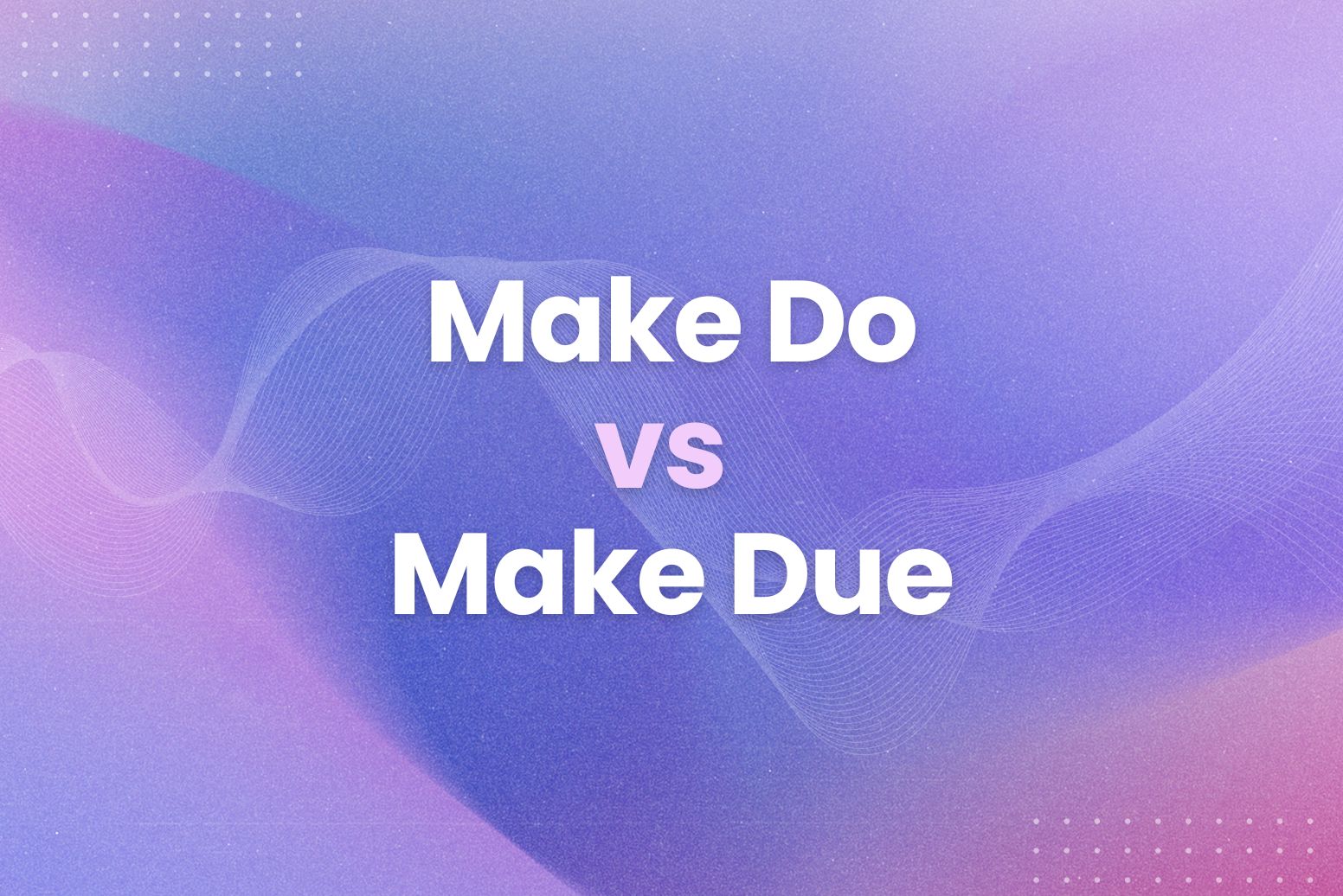Have you been confused about “make due” vs “make do”? This mix-up catches even the most careful writers off guard. But getting it wrong can make your writing feel sloppy. And nobody wants that.
In this article, we’ll break down the difference between make do vs make due with clear examples. You’ll leave knowing when to use each phrase — and how to avoid embarrassing mistakes.
Here’s what we’ll cover:
- Firstly, the correct meaning of “make do”
- Secondly, why “make due” is usually wrong
- Then, examples of both phrases in action
- Lastly, a quick tip to remember the difference
Stick around. By the end, you’ll never confuse the two again.
The Correct Meaning of “Make Do”
“Make do” means to manage with what you have, even if it’s less than ideal. It’s about adapting to a situation without expecting perfection. For example, if you wanted steak for dinner but only have pasta, you “make do” with the pasta. It’s a phrase rooted in practicality.
This expression is widely used when discussing compromise or resourcefulness. You’ll see it in conversations like, “We’ll have to make do with the budget we’ve got.” Notice how it emphasizes working within limits rather than seeking an alternative.
In short, “make do” is about finding a way to get by, no matter the circumstances.
Pro Tip: If you’re not sure about your grammar, tools like Arvin’s grammar checker can spot errors like confusing “make do” with “make due.” It’s an easy way to sharpen your writing without second-guessing.

Why “Make Due” Is Usually Wrong
“Make due” is a common mistake, but it’s almost always incorrect in standard English. The confusion likely comes from how similar it sounds to “make do.” However, “make due” doesn’t mean the same thing and rarely fits grammatically.
Let’s break it down.
- What does “due” mean?
- “Due” refers to something that is owed, expected, or scheduled. For instance, a payment can be “due” by a certain date, or a train can be “due” to arrive. It’s specific and has nothing to do with making do with limited resources.
- Why doesn’t it work in this context?
- The word “make” combined with “due” creates an awkward and nonsensical phrase. For example, saying, “We’ll make due with what we have” doesn’t align with the definition of “due.” It sounds off and doesn’t convey the intended meaning of compromise or resourcefulness.
- Is “make due” ever correct?
- Technically, yes, but only in a rare scenario where “due” retains its original meaning. For example:
- “We need to make due payment by the 15th.” Here, “due” refers to something owed (like a payment). But even in these cases, the phrase is formal and outdated.
- Technically, yes, but only in a rare scenario where “due” retains its original meaning. For example:
How to Avoid This Mistake
To avoid using “make due” incorrectly, remember:
- If you mean adapting or compromising, always use “make do.”
- If you’re writing about something owed or expected, double-check if “due” fits the sentence.
Examples of Make Do vs Make Due
Seeing these phrases in action makes it easier to understand how to use them correctly. Let’s compare “make do” and “make due” in practical contexts.
Correct Usage of “Make Do”
- “We don’t have eggs, so we’ll have to make do with toast.”
This shows adapting to what’s available. - “The old printer isn’t ideal, but we’ll make do until the new one arrives.”
A perfect example of working with limited resources. - “They didn’t have my size, so I made do with a larger shirt.”
Here, compromise takes center stage.
Rare but Correct Usage of “Make Due”
- “We need to make due payments by next Friday.”
In this case, “due” refers to something owed, like payments. - “The train will make due stops along the route.”
This is a formal way to say the train will stop as scheduled, but it’s not common in modern usage.
Incorrect Usage
- “We’ll make due with what we have.”
This is wrong because “due” doesn’t mean adapting or compromising. - “She had to make do payments on time.”
Here, “do” is mistakenly swapped for “due,” which changes the sentence’s meaning entirely.
A Quick Fix for Confusion
When in doubt, remember: “Make do” works for compromises. “Make due” rarely works, and only if “due” means something owed.
If you’re still unsure, Arvin’s grammar checker can step in. It catches these tricky errors, explains the rules, and helps refine your writing.
A Quick Tip to Remember the Difference
Here’s a simple way to keep them straight:
- “Make do” is about doing something with what you have.
- “Make due” involves something due, like a payment or deadline.
To clarify, think of “do” as action and “due” as obligation.
For example, if you’re making do, you’re adapting. If you’re making due, it’s likely about something owed.
Never Confuse “Make Do” Again with Arvin
Understanding make do vs make due doesn’t have to be complicated. With the right examples and simple rules, you can use these phrases confidently every time.
Here’s a quick recap:
- Firstly, “Make do” means to adapt or manage with what’s available.
- Secondly, “Make due” refers to obligations like payments or deadlines.
- Lastly, most of the time, “make do” is what you need.
Grammar mistakes can sneak into even the best writing. That’s where Arvin comes in. Arvin’s grammar tool helps you spot errors like confusing “make do” with “make due.”
It works seamlessly in your browser, giving you real-time feedback as you write. Why second-guess yourself when Arvin can make your writing sharper, faster?
FAQs
Do you say “make do” or “make due”?
You say “make do.” It means to manage with what’s available, even if it’s not ideal. “Make due” is incorrect in this context and should be avoided unless “due” is referring to something owed or expected.
When to use “due” or “do”?
Use “do” for actions, tasks, or activities (e.g., “I’ll do my homework”). Use “due” when talking about something owed or expected (e.g., “The rent is due tomorrow”). They have distinct meanings, so double-check your context.
What does “make the due” mean?
“Make the due” is not a standard phrase. If you mean paying something owed, it’s better to say, “Make a due payment” or simply “Pay what’s due.” Avoid using “make the due” as it may confuse readers.
When to use “make” or “do”?
Use “make” when creating or producing something (e.g., “Make a sandwich”). Use “do” for actions, obligations, or tasks (e.g., “Do your best”). Some phrases, like “make do,” are exceptions and rely on established usage. Tools like Arvin can help clarify these subtle differences.






